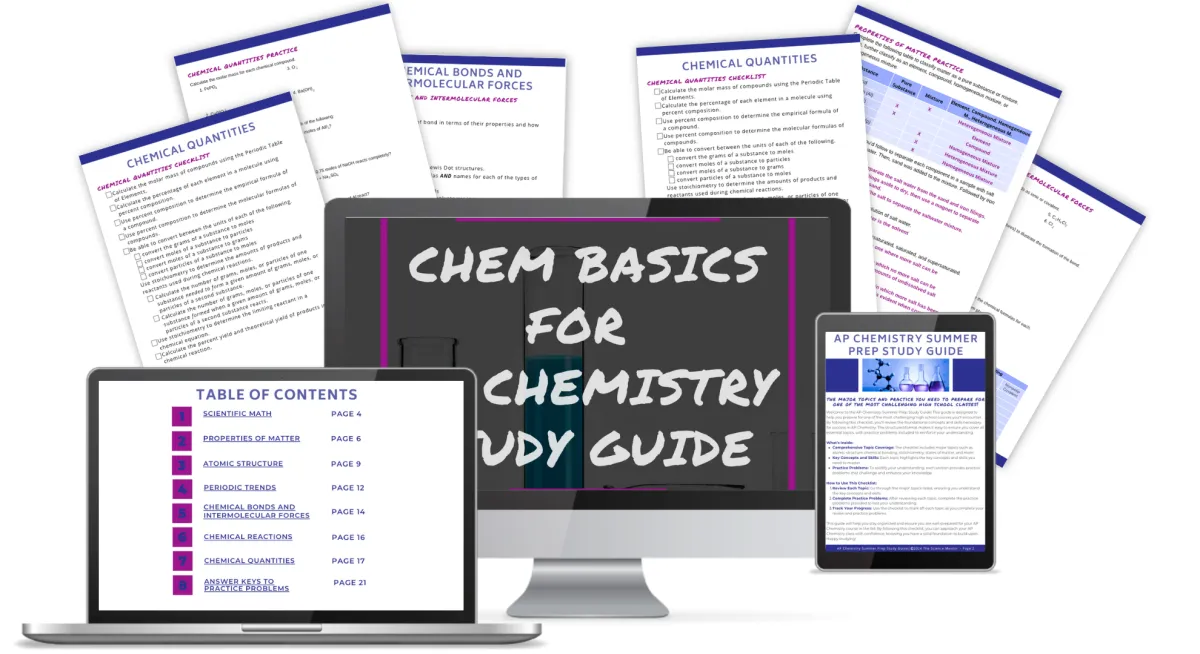Are you a parent looking to give your student a head start in one of the hardest high school courses they'll ever take?
Chem Basics for AP Chemistry Study Guide
This 30-page Chem Basics for AP Chemistry Study Guide is the perfect resource to review the major topics from high school chemistry they should know before starting AP Chemistry strong in the Fall, and STAY confident throughout the school year.
This isn’t just a summer prep guide. It’s a must-have resource that your teen can reference throughout the entire AP Chemistry course, returning to specific topics as needed.

Grab Your FREE Chem Basics for AP Chemistry Study Guide! Enter your info below to have the guide delivered to your inbox!
How do you plan to use this guide? (Check all that apply!)
Why Download the Chem Basics for AP Chemistry Study Guide?

Structured Learning
An easy-to-follow checklist designed to guide your student through crucial topics from their previous chemistry class.

Targeted Practice
Practice exercises and example problems for each topic to enhance understanding and retention.

Confidence Building
Alleviate anxiety and equip your student with the knowledge and skills they need to excel in AP Chemistry from day one.
What's Covered?

Scientific Math
In this section, your student will refine their skills in unit conversions, dimensional analysis, applying significant figures in values and operations, and using scientific notation.

Scientific Math
In this section, they will differentiate and classify various forms of matter by reviewing states of matter, elements, compounds, pure substances, and types of mixtures, including solutions.

Atomic Structure
In this section, your student will review how to determine protons, electrons, and neutrons in atoms, ions, and isotopes, calculate average atomic mass, understand electron configurations, and perform energy calculations.

Periodic Trends
In this section, your student will explore the organization of the periodic table and explain trends in atomic and ionic radii, electronegativity, and ionization energy, providing them with the essential knowledge required for the AP Chemistry exam.

Chemical Bonds and Intermolecular Forces
In this section, your student will study types of chemical bonds and electron behavior in each, master nomenclature, create Lewis dot structures, and understand intermolecular forces.

Chemical Reactions
In this section, your student will review how to identify types of chemical reactions, predict products, and write complete balanced chemical equations as well as net ionic equations.

Chemical Quantities
In this section, your student will review calculating molar mass, performing various mole conversions, determining percent composition, and executing stoichiometry calculations.

Click below to get your free copy of the 30-Page Chem Basics for AP Chemistry Prep Checklist and give your child the tools they need for success.
Grab Your FREE Chem Basics for AP Chemistry Study Guide! Enter your info below to have the guide delivered to your inbox!
How do you plan to use this guide? (Check all that apply!)
Hi There! I'm Kesha (but my students call me Doc!)
I’m a scientist nerd who left the lab to follow a passion for teaching in 2002 and has been teaching ever since.
With years of experience teaching and supporting students in science, I've seen it all and helped countless students thrive.
I've also had specialized training with the College Board just for AP Chemistry, so you can trust that I know my stuff!
My goal is to make this journey a little easier and a lot more fun for your student.
I'm passionate about education and here to ensure your child feels confident and prepared for one of the toughest high school courses out there.

Prepare your student for AP Chemistry!
Click below to get your free copy of the Chem Basics for AP Chemistry Study Guide and give your child the tools they need for success.

Grab Your FREE Chem Basics for AP Chemistry Study Guide! Enter your info below to have the guide delivered to your inbox!
How do you plan to use this guide? (Check all that apply!)
©2024 The Science Mentor.com ⎮ Terms and Conditions